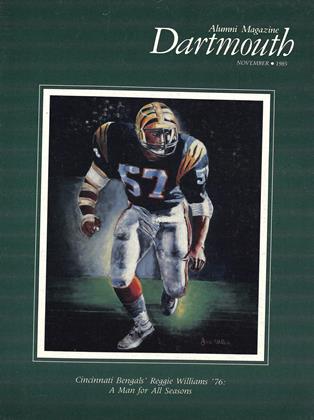Calling the university art museum "the gymnasium of perception," artist Frank Stella, the visiting speaker at this year's Convocation exercises, said, "There is no
question that visual education has become an important part of our educational philosophy. We know we have to use all of our senses to understand our experience and expand our knowledge." He went on to "make a special plea for the support of a special institution - the university art museum."
Along with President David McLaughlin and Student Assembly President William Perkins '86, Stella helped mark the beginning of Dartmouth's 216th academic year. Tucker Foundation Dean James Breeden '56 delivered an invocation to open the ceremonies, which included the traditional procession of faculty in academic regalia, trumpet voluntaries by the New England Brass Consort, and the arm-in-arm singing of "Men of Dartmouth."
Stella, who was awarded an honorary doctor of arts degree by President McLaughlin at Convocation, was at Dartmouth to participate in the opening of the new Hood Museum of Art. A Princeton graduate, Stella has been described by NewYork Times art critic John Russell as "the strongest American painter of his generation."
Stella called his appearance at Dartmouth "a kind of homecoming," since he had served a term as artist-in-residence at the Hopkins Center in 1963, shortly after the center was opened. On the basis of his teaching experience, he had some suggestions for the new Hood Museum. "The temptation," he said, "is to see the ideal small museum as a reduction of the ideal big museum, but I don't think we should succumb to it. . . My own feeling is that a university museum should take what it can get, press its benefactors to keep the level of quality of its donations as high as possible, and make the presentation of what it has as accessible and coherent as it possibly can."
He concluded his speech with an examination of the relationship between a work of art and its viewer, noting the Hood's potential to encourage this relationship. "There are reasons to believe that the Hood Museum will be an unqualified success. The very best reasons are the multitude of eyes in front of me today. What you see will breathe life into the objects preserved in the Hood. What you think will make them tell you a thing or two about what art's really about. . . I believe there is a reciprocal relationship between a viewer and an object viewed. . . We have all experienced a strange resonance in front of paintings we like, where our natural, inherent sense of beauty seems to engage a similar force emanating from the painting itself. . . This beauty is certainly its own worthwhile reward. More than this, though, it is a powerful tool, a tool for education and a tool for social good."
Following Stella's remarks, President McLaughlin addressed the gathering, noting that Stella's presence at the Hood dedication "celebrates the creative nature of the life of the mind." Alluding to the College's history and purpose, the president announced a period of formal institutional reassessment in the coming months. "As one views the future aims of the College," he said, "it is increasingly evident that . . . our institutional priorities must always be open to review and, where necessary, to revision."
Noting that "we presently stand on the edge of the next millennium," McLaughlin expressed the hope that "the liberal-learning opportunities offered here will serve more effectively the lives of our students in the decades ahead." He said the Trustees of the College "have thought it both appropriate and desirable to invite the members of this community to devote a significant portion of their time and energy over the next several terms to analyzing and discussing together - as an important joint undertaking — the desired nature and status of Dartmouth College 15 years into the future. We wish to set in motion a process to determine how our resources - human, financial, and physical
- can best be allocated to achieve the goals identified."
The last time Dartmouth undertook a formal planning reassessment was in 1955. "Given the changes that have occurred on and beyond the Hanover Plain since then," McLaughlin said, "such a renewed undertaking would seem to be overdue." He described the effort as "an internal examination of where we are, where we want to be at the turn of the century, and how we can to best advantage utilize limited resources in achieving our goals."
Eben Haber '88 gives the Dartmouth Experience a new twist:While doing guard duty by the freshman bonfire last year,he kept up with his coursework by setting his Macintoshcomputer on a couple of handy railroad ties.
Dartmouth as usual [has] the best, brightest, most motivated and most spirited players, coaches, student body, faculty, administration, and alumni." —Dave Gavitt '59, commissioner of the Big East Conference, predicting the winner of the Ivy football championship in the September 1985 BrownAlumni Monthly
 View Full Issue
View Full Issue
More From This Issue
-
 Cover Story
Cover StoryA Man for All Seasons
November 1985 By Douglas McCreary Greenwood '66 -
 Feature
Feature"Shakespeare in Sable"
November 1985 By Errol Hill -
 Feature
FeaturePolitics in an electronic age
November 1985 By Jim Newton '85 -
 Article
ArticleConnie Lambert: Doyenne of "The Daily D"
November 1985 By Georgia Croft -
 Class Notes
Class Notes1978
November 1985 By Catherine A. Gates -
 Sports
SportsTough days on the gridiron
November 1985








